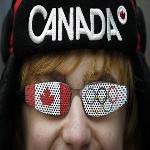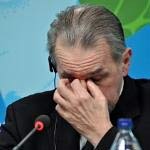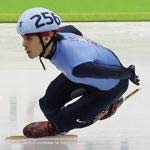
The Vancouver Olympics ended on Sunday and it could not have been a much better finish for host country Canada, which won the final gold medal.
This was an Olympics that began on a sad note after the death of Nodar Kumaritashvili, a young luge athlete from Georgia, during a practice run on the same day as the opening ceremonies.
International Olympic Committee President Jacques Rogge told reporters Sunday that must not be forgotten and that lessons can be learned from the tragedy.
"We have a moral responsibility of making sure that the games are as safe as possible," he said. "We will never be able to eliminate all risks, and athletes who engage in competition are taking these risks also. But we must be sure we have taken the measures to diminish the risks to the maximum."
Rogge says he did not sleep for two nights after the Georgian's death. Still, he says he marveled at the excitement of the Canadians proudly wearing and displaying their nation's red and white colors everywhere in and around Vancouver.

"There was an extraordinary embrace of the entire city of the Olympic Games, something I have never seen on this scale before," said Rogge. "I've seen some embrace, of course, good embrace, of the Games in Lillehammer [in 1994], but Lillehammer [Norway] is a small city of 20,000. Here we are over one million, so that means that it is totally different. This is really something unique and it gave a great atmosphere for these games."
Jacques Rogge says many Canadians have told him that having the Olympics in Vancouver has united the country like they have never seen before.
Canadian athletes certainly proved themselves worthy on the field of play, winning 14 gold medals, which is a record at a Winter games.

The crowning achievement came in the final sporting event Sunday. In their national sport of ice hockey, the Canadian men won a thrilling overtime victory for the gold medal 3-2 over their rivals and neighbors to the south, the United States.
With that silver medal, Team USA finished with the most medals in Vancouver, with 37, including nine gold. It is the most medals won by any nation at a Winter Olympics.
Scott Blackmun, chief executive officer of the U.S. Olympic Committee, said it was result of hard work.
"It says our athletes were well prepared, that they had a fantastic games," he said. "We really don't view this as a competition between nations as much as it is a competition between athletes, and our athletes have done a phenomenal job here. And, our success here helps us commercially. It helps us with the broadcasts. To us, we're thrilled they did just as well off the field as they did on the field. They really, I think, represented us very well."

Among the highlights - alpine skier Bode Miller, a two-time overall World Cup champion, ended the frustration of being shut out in the last Olympics by winning a set of medals, a gold, silver and bronze. Short track speed skater Apolo Anton Ohno became the most decorated U.S. Winter Olympian, winning three medals here for a career total of eight. Bill Demong became the first-ever American to win a gold medal in Nordic Combined and the Steve Holcomb drove his four-man bobsled team to the first U.S. Olympic gold medal in the event in 62 years.
Germany was second behind the USA in the total medals count with 30, and second behind Canada in gold medals with 10. The Canadians were third in total medals with 26.
The big individual medal winner in Vancouver was Norwegian Marit Bjoergen. She won five in cross-country skiing with three golds, one silver and one bronze. Norway was fourth in total medals with 23 and tied the U.S. with the third most gold with nine.
In all, 25 nations won at least one medal at the Vancouver Games. Thirteen won gold medals. Britain, which will host the Summer Olympics in 2012 in London, won only one medal, a gold by Amy Williams in women's skeleton. Russia, the host nation for next Winter Games in Sochi in 2014, won 15 medals, three of them gold.
Two world records were set during the Vancouver Olympics, both in short track speed skating and both by China. Zhou Yang broke the women's 1000-meters record, beating the previous mark held by compatriot Wang Meng. Zhou, Wang and their two teammates bettered the mark in the 3000-meter relay that China had set at the 2002 Salt Lake City Olympics.
US college students get 'on the job training' at Vancouver Olympics
Canada edges US to win men's team pursuit gold
Vancouver Organizing Committee faces Olympic questions head on
(來(lái)源:VOA 編輯:陳丹妮)
